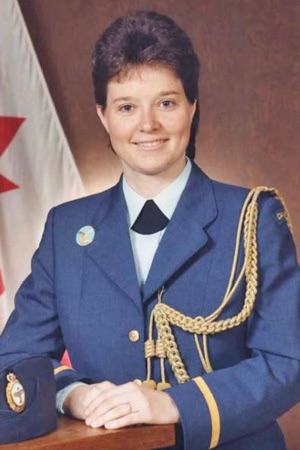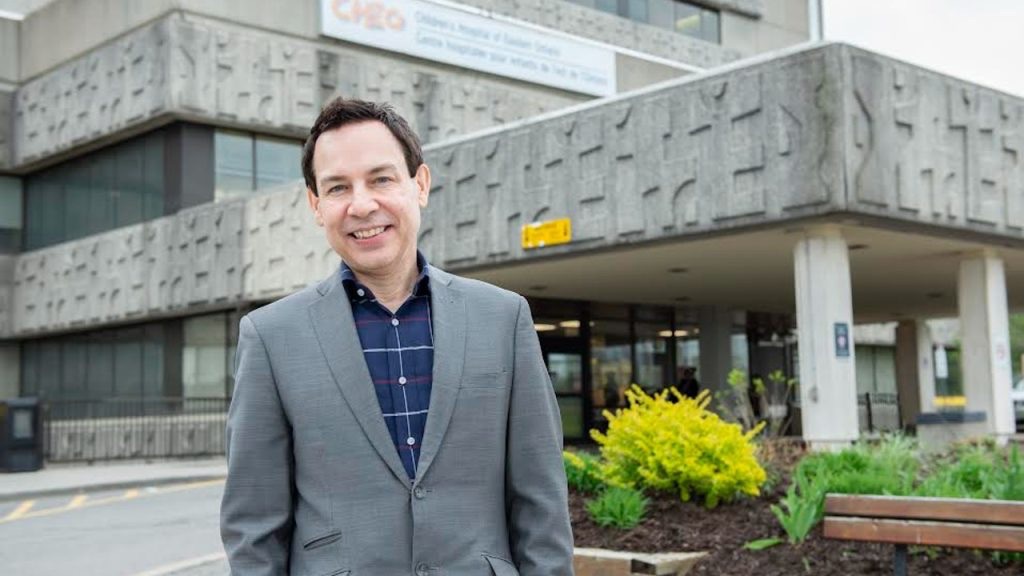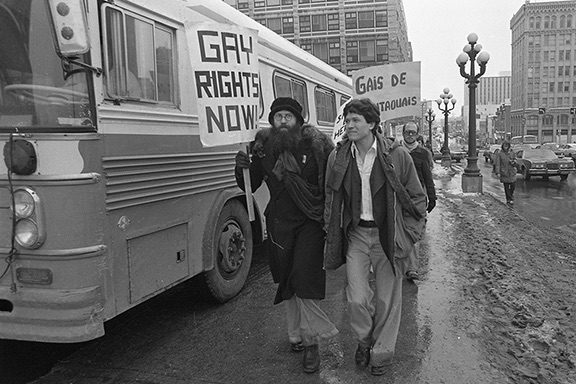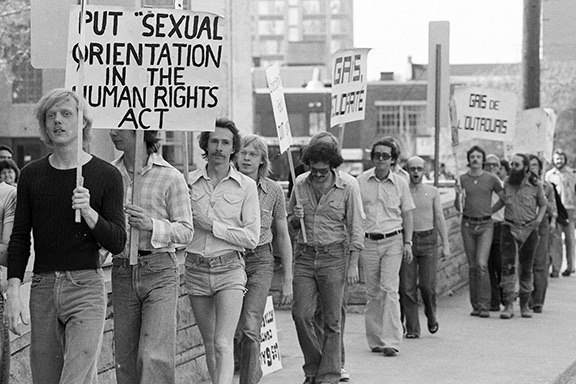The 1970’s were a time of flower power, Elton John and high-waisted jeans. In Ottawa and around the world, the decade marked the beginning of a sexual awakening.
Gays, lesbians, bisexuals and transgender individuals left their closets one by one to put an end to homophobic, discriminatory practices. They were tired of putting on a facade and living in fear because of who they were born to love.
On a rainy day in late August 1971, Canada’s first pro LGBTQ2S+ protest was held on the front lawn of Parliament Hill. About 80 men and women with stylish long hair, large beads and signs promoting love over hate, put themselves on display to fight for equal rights. To say it was a controversial act would be an understatement.
While same sex acts were legalised a few years prior, citizens could still be fired from their jobs and outed publicly for being gay. Police brutality targeting the community was on the rise, and gay immigrants were barred from entering Canada.
Anti-gay purges
Between the 1950s and 1990s, homosexual Canadians who worked in the civil service, RCMP, and armed forces were fired because of their sexual orientation. The reason? government officials determined that homosexuality was a “character defect”, and therefore a security risk because gays and lesbians could be targets for blackmail by the Soviets.
In the 1960s, Dr. Frank Robert Wake, a psychology professor at Carleton University, developed an array of tests aimed at identifying and then eliminating gay individuals who were working in the Canadian government.
Labelled the “fruit machine”, or the homosexuality test, it was designed to measure perspiration and pulse such as pupil dilation when the subject was shown same-sex nude or semi-nude images. It garnered faulty results. To begin with, researchers failed to take into account the varying sizes of pupils and the differing distances between the eyes. Pictures of the suspected homosexuals’ eyes had to be taken from an angle, and the brightness of light coming from photographs changed with each image.
For over four decades, approximately 9,000 Canadians were marshalled into small, windowless interrogation rooms and questioned regarding the possibility that they were gay. If they admitted to it, they were forced to resign or they were abruptly fired. Their careers, self confidence, and privacy were ripped away from them. Opportunities for promotion, severenance, benefits and a pension were also stripped.
Long-time Ottawa resident Michelle Douglas always wanted to serve her country and had aspirations of becoming a military police officer. She joined the Canadian Armed Forces in 1986 and was quick to climb the ranks. Douglas was the top of her class and a hard-working, loyal soldier. Then suddenly her world changed.
“I had the lovely experience of falling in love with a fellow officer and she was lovely,” Douglas explained to KT. “Somebody went and told the military. I know exactly who it was who reported me to the police. I consider it a shame on them because I was a good officer. It was astonishing to imagine that I’d somehow be reported because I had fallen in love with another woman.”

Douglas had just begun working in the special investigations unit in 1989 – ironically the division assigned to investigate homosexuals – when a superior officer said they were leaving immediately to investigate a case in Ottawa. That was a lie. When the car Doulgas was in approached the Toronto Pearson Airport, it abruptly turned into a nearby hotel parking lot.
“I spent the next two days being interrogated about my sexual orientation. It was a very stressful and difficult time,” Douglas remembered. “It was humiliating, degrading and shameful. It was shattering. I was a young woman, at the top of my class.”
For hours, Doulgas denied her attraction to females. She refused to give up the names of other Queer officers, and wouldn’t take a polygraph test. In the end she chose truth over fear and admitted to being gay.
Douglas was almost immediately discharged because she was “not advantageously employable due to homosexuality.”
In January 1990, Douglas launched a $550,000 lawsuit against the Department of National Defence. In October 1992, after reversing its ban on LGBTQ soliders, the military settled the legal challenge just before it went to trial.
“Ending discrimination by policy does not just end discrimination,” she said. “It’s been a 30 plus year pursuit working in reconciliation, working on ensuring policies improve and change and that protections exist. People can no longer be fired on the basis of being queer. Gender confirmation surgeries [for members] are now paid for by the Canadian Armed Forces.”
Raiding Wellington West
One of the most open acts of homophobia in Ottawa occurred in Wellington West on May 21, 1976, when a gay bathhouse at 1069 Wellington Street West was raided. Police stormed the underground building and arrested 27 naked men – 22 who were charged as ‘found-ins.’ Their crime? participating in same-sex activities.
Club Ottawa owner Peter Maloney said financial documents and the bathhouses membership list of 2,400 names were seized – an easy way for police to see who in the city was living a double life.
At trial, Maloney was found guilty and was given a discharge on the basis of one year’s probation. Andrew MacKey, the 28-year-old who managed the Club, pled guilty and was fined $500.
Fifty years later, Club Ottawa remains open, yet most who pass its subtle door between Central Spa and Bread By Us would never know it exists. No signs advertise its presence, and no widow’s peak out of the underground space that includes saunas, lockers, showers, and private rooms.
On Aug 2, 1999, a group of 10 American anti-gay demonstrators protested in front of the Supreme Court of Canada. Their posters were seized and they were questioned for hours at the Macdonald-Cartier International Airport.
They were followers of anti-gay pastor Rev. Fred Phelps. Their discontent came after the Supreme Court of Canada ruled that the definition of common-law marriages must also include homosexual couples.
The group marched outside of All Saints Westboro Anglican Church and Westboro Baptist Church. They sang songs and chanted “God hates Fags.”
Richmond Road area resident Lean Lemoine carried her own sign which read “These People Are Nuts” and told the Ottawa Citizen that she was disturbed their messages would “create great intolerance which can lead to such things as murder. If they believe they are Christians, they’re certainly not acting that way.”
A sign of progress
In 1993, Alex Munter, then a young city councillor for Kanata, came out as gay in an opinion piece published in the Ottawa Citizen. He was the Ottawa area’s first openly gay politician.
Munter used it as an opportunity to speak out about the harsh treatment gay people faced compared to heterosexuals, and said he joined the NDP 10 years prior because it was a party “that had always fought for the rights of people like me.”
In fact it was former Ottawa-Centre NDP MPP Evelyn Gigantes that first proposed a legislative amendment to outlaw the discrimination against gays and lesbians under the Ontario Human Rights Code. It was passed 64–45 at Queen’s Park a month later.
“The province has been contemplating legal recognition of lesbian and gay relationships for over two years. Its now time for action,” Munter wrote. “In every community, including my city of Kanata, gay and lesbian couples are raising children, yet their legal rights are murky.”

Munter knew he was gay in high school and was open with his family and friends before sharing that part of himself with the world. He said it felt “dishonest” and “untenable” to live under the “don’t ask, don’t tell model.”
A few months before his public announcement, Munter and his then boyfriend were stopped on the street and faced homophobic remarks by a carload of young men. The hatred didn’t stop there.
“People wrote letters to the editor of my local newspaper in Kanata basically saying I wasn’t capable of being a councillor because I was a gay person. There was quite a concerted effort and it created a climate,” Munter recalled to KT. “There was a lot of homophobic vandalism of my campaign materials and signs.”
But there was love and acceptance too. Munter said the evening before his op-ed was published, he drove around town putting letters in mailboxes of supporters who he wanted to know the news before it was public. Munter recalled how one woman, an evangelical Christian who left the United Church when it began to ordain gay people, drove over to his house for a hug and encouraging words of love and acceptance.
Munter still went on to win that year’s municipal election and continued to serve on council until stepping aside in 2003.
In 2019, Munter, now CEO of the Children’s Hospital of Eastern Ontario (CHEO), received an anonymous letter in the mail with no return address. It came from one of the teenagers who defaced his election signs.
“I am truly sorry for doing this to you. We were dumb teenage boys,” the hand-written letter read. “You are an outstanding member to the community and are truly special. All of us that did this to you are now adults with kids of our own. We are all inclusive and are definitely not prejudiced to anyone in the LGBTQ community.”
Changing generations
When Munter was first discovering himself, the former politician and newspaper publisher said he was growing up between two generations: the homophobic practices of the 1950s and 60s were largely over, but the connected generation of today with access to countless resources had not begun.
“It was a lonely time because I was living with a secret,” said Munter. “I knew gay people were out there but there was no way for me as a high school student to have peers or support or anything like that.”
In 1984, activist group Gays of Ottawa launched Pink Triangle Services, known today as Kindspace, to act as a refuge for LGBTQ2S+ people who were finding themselves.

Today Kind Space operates out of 400 Cooper St. and sees about 50 people pass through its doors on any given week. The centre is used to house drop-ins, host events, and offer resources.
“It’s important to have a space like Kind Space because look at the state of the world. When we started in the 80s acceptance for queer and trans people was not very high,” said Kind Space executive director Carling Miller. “Even though there are more protections legally for queer and trans people, we still have a high percentage of kids that get locked out of their families for being who they are. There is still a lot of shame that is carried by people who have those identities. Our identities are often weapons, especially in politics for political gain. They are used as a ‘boogeyman’ or justification for why violence can or should be done against us.”
Capital Rainbow Refuge is another non-profit organization that helps Queer individuals in other countries immigrate to Eastern Ontario. The group was volunteer-run when founded in 2010, but this year hired six staff. Over 100 Queer people have been assisted in the last decade-and-a-half.
“Everyone deserves a safe home. In more than 70 countries people are suffering because of who they are. There are police actions and family problems,” said Nini Rossi, fundraising and communications coordinator at Capital Rainbow Refuge. “For many, their only option is to flee their countries and homes for a safe haven.”
Many of the clients are from Middle Eastern and African countries such as Palestine, Saudi Arabia, Afghanistan, Ghana, South Sudan, and Algeria. In some of these places, you can still face the death penalty for being gay.
Earlier this year, Rainbow House opened which offers refuge to the LGBTQ2S+ newcomers.
“It’s an opportunity we had to partner with Matthew House and we currently accommodate nine residents by helping them through establishing themselves here in Ottawa,” said Rossi. “They can stay three to six months and have access to essential services like making friends, finding jobs and housing.”
